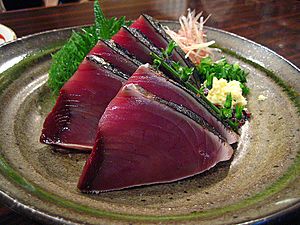Tataki facts for kids
Tataki is a special way to prepare fish or meat in Japanese cuisine. It is also sometimes called tosa-mi. In Japanese, the word tataki (たたき) means "pounded" or "hit into pieces."
There are two main ways to make tataki. One way involves cooking the food, and the other involves chopping it up uncooked.
Contents
Seared Tataki: A Cooked Method
One way to make tataki is by searing. This means the meat or fish is cooked very quickly over a hot flame or in a pan. It gets a nice cooked outside but stays mostly raw inside.
After searing, the food might be briefly soaked in vinegar. Then, it is sliced into thin pieces. People often season it with ginger. The ginger is usually ground or pounded into a paste. This pounding is why it's called "tataki."
This type of tataki can be served like sashimi. You can eat it with soy sauce and other toppings.
History of Seared Tataki
This searing method started in a place called Tosa Province. This area is now part of Kōchi Prefecture in Japan. It was first used for bonito fish, which is called katsuo-no-tataki in Japanese.
There's a story that a famous 19th-century samurai named Sakamoto Ryōma created this method. He learned about grilling meat from foreigners in Nagasaki. He then used this idea to cook fish in a new way.
Chopped Tataki: An Uncooked Method
The second way to make tataki involves "hitting the food into pieces." This method uses uncooked food.
Fish like tuna or horse mackerel are chopped into small bits. Then, they are mixed with other tasty ingredients. These can include garlic, ginger, green onions, or shiso leaves. Before eating, people often pour soy sauce over the chopped mixture.
See also
 In Spanish: Tataki para niños
In Spanish: Tataki para niños
 | Laphonza Butler |
 | Daisy Bates |
 | Elizabeth Piper Ensley |


